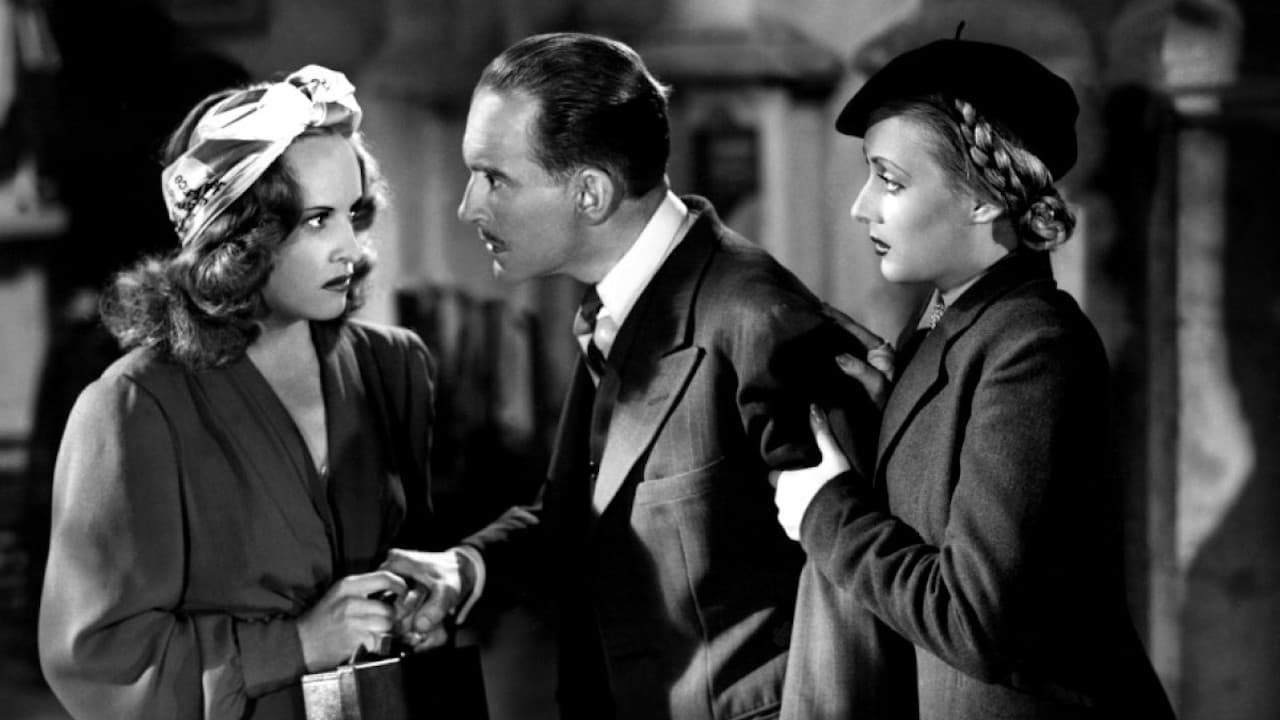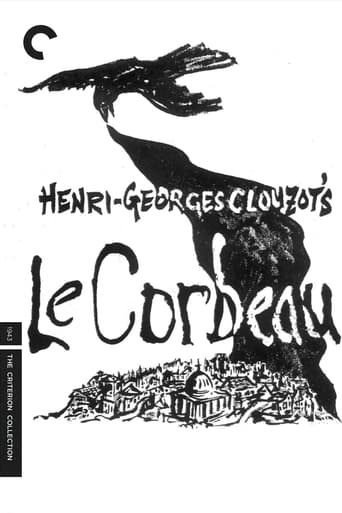



Most undeservingly overhyped movie of all time??
It isn't all that great, actually. Really cheesy and very predicable of how certain scenes are gonna turn play out. However, I guess that's the charm of it all, because I would consider this one of my guilty pleasures.
View MoreIt really made me laugh, but for some moments I was tearing up because I could relate so much.
View MoreAmazing worth wacthing. So good. Biased but well made with many good points.
View More*****CONTAINS SPOILERS***** Having seen Les Diaboliques before this thriller from Clouzot I expected that Le Corbeau could not match Les Diaboliques. And it didn't but it was not far off. But remember that Le Corbeau was the second movie directed by Clouzot and made 12 years before Les Diaboliques. So he had some time to perfect his skills.The movie manages to hide the identity of the writer of the poison-pen letters to the very end although there are hints during the movie and these are even mentioned by the perpetrator himself. One uneasy fact of the story is the quite amicable relation the writer of the letters has with the main character of the movie (Remy) who happens to have a more than friendly relation with the wife of the writer. Creating the illusion that he doesn't mind this because of the age difference between him and his wife, he sets out to destroy Remy (Remy in the meanwhile also becomes the lover of another woman). While doing this he is responsible for the death of a patient, nearly destroys his ex-fiancée who happens to be the sister of his wife but also his supplier of Morphine and spills the beans on a lot of people in the village. Indeed quite a devious but still amicable person. But he finds his end at the hands of a grieving mother and that is how the movie ends leaving the viewer to wonder what Remy would do: report her or not?What is interesting about this movie that it was made during WWII when France was occupied by the Germans. The movie was made for a German film company and it landed Clouzot a ban on making movies for a few years after WWII. The movie was denounced by the French resistance and the German occupiers did not endorse it. My interpretation is that Clouzot managed to make a thriller with a hidden message: that in times of trouble (war) no one is to be trusted and that the one who is to be distrusted the most is the one you least expect it of. I think it was a message to people to be very careful because no secret remains hidden and informers are everywhere. And to be careful for scapegoating. Anyway, that is my interpretation.
View MoreIn French, the 'crow' is a bird reference defining an anonymous letter sender, generally, poison pen letters, meant to denounce someone or to threaten him. Henri-George Clouzot's "The Crow" is based on a true story that occurred in Tulle, in 1917, a small town in the middle of France. Albeit the origin is true, "The Crow" takes place in a small town "like any other", anywhere in France, it couldn't occult the fact that the practice became very popular during the German occupation, when many French people, claiming to be 'good citizens' or only making their duty, denounced Jews, resistant or relatives to the local Police. "The Crow" was released in 1942, during the occupation, like another French masterpiece "Children of Paradise", but while the context hardly impacted the content of Carné's film, it would be difficult to overlook it for Clouzot, a controversial practice for a controversial time.The film opens with Docteur Remi Germain (Pierre Fresnay) a no-nonsense hardly smiling man, an unusual choice for a lead but another proof that Clouzot is beyond archetypes. Germain doesn't like children but lives in a school director's house, which is not his first paradox, he's very professional with his patients yet indulge himself to some displays of friendship with the beautiful Laura Vorzet (Micheline Francey), the wife of the elderly psychiatrist doctor, played by Pierre Larquay. Laura's sister, an unpleasant and unattractive nurse suspects something going between them and shows it through her constant hostility toward Germain. To complete the picture, the school director's daughter Denise (Ginette Leclerc) and town's slut, is in love with German but can't stand the way he ignores her. In ten minutes, we are familiar with most of the protagonists and the range of suspicions is very wide as soon as the first of the several anonymous letters turn the peaceful town's life into a terrifying witch hunt. The letter accuses Germain of practicing abortions and having illegitimate relations with the doctor's wife. Anyone could have written it as suggests one of the film's most delightful scene. The sympathetic Larquay, remarkably contrasting with Fresnay's coldness, enumerates all the possibilities: it could be anyone. Then, before he leaves, Fresnay asks him the question that tickles our mind: "for all we know, it could be you", to which the doctor responds "possible", as a mystery the film has a sort of Agatha Christie feeling. When everybody is suspect, there are chances not everyone would be truly 'innocent'.And then we touch the controversial core of the film. Clouzot has often been blamed for portraying unsympathetic characters, I won't be the devil's advocate, but I guess I understand why this criticism is often expressed. Clouzot has an extraordinary talent to explore the darkest sides of the human soul: jealousy, envy, greed, lust and much more hypocrisy. Remember Jo in" Wages of Fear" playing tough during the first act before revealing his cowardice, in "The Crow", people are not unsympathetic, but the letters that denounced them awaken defensive and egoistical reactions. "The Crow" is built like a mystery but resonates like a profound and subversive commentary of the methods and practices that prevailed and that inspired the worst from good citizens.Yet the ambiguity remains because while everybody is suspect, everybody is also victim of these accusations when letters start being sent to all the population, when everyone is both an accuser and accused. The cheaters, the cuckold, the sluts, the upstarts, they're all denounced, and sometimes the subject is treated with less gravity and more comedy, like when the Postmaster takes a letter for his wife, a gesture that doesn't fool his employees. The Crow opened a Pandora box that can be paralleled with the presence of Germans in France, with the growing paranoia and suspicion effect applying to everyone. "The Crow" even shares a similarity with the Nazi's black eagle, a bad omen for the population. But even this conclusion is debatable, the Occupation is never mentioned, the story could take place in the mid 30's as well, but it was considered Anti-French, in the way it was vilifying the population, but Anti-French in the 40's can be a good reason to see it with more positive eyes a few years later. Except Clouzot produced it with a German-owned company, and the film features an unforgettable scene set in a classroom, when Dr Larquay swings a lamp that lights a globe, putting light and shadow in different parts of the room, in order to expose the ambivalence of the world, what is exactly right, or what is wrong is a matter of perception. This kind of cynical speech can also serve as an alibi for the detractors until the very ending of the film gives another resonance to the scene. As usual with Clouzot, the most memorable moments of his films happen to be the most controversial. And the controversy surrounding "The Crow" is understandable as long as it doesn't overlook the remarkable direction of the film that transcends the intelligence and subversiveness of its screenplay, foreshadowing more great movies to come. Henri-George Clouzot also demonstrates his unique talent with moves about everyday people trapped in extraordinary situations: doctor, magistrate, cops, housewives, teachers, janitors. Pierre Fresnay, the Captain from "Grand Illusion" is again perfect as the doctor Remi Germain but the scene-stealer remains Larquay with his inimitable voice and intelligent analysis and Ginette Leclerc as a good-hearted and femme fatale-like Danielle. I use the word because the film has often been labeled as the first film noir of French cinema along with "Quai des Brumes", maybe it is true in the way it echoes the 'darkest' and most inclined to pessimism period of French history, it makes "The Crow" even more historically and culturally significant anyway.
View MoreThis is, for the most part, an interesting little movie that explores how a series of anonymous poison pen letters tear a town apart. The idea is intriguing, there are some notable scenes, as in one where the town turns on someone they think is responsible, and the movie does a good job of throwing suspicion on various people.At the same time, the movie often has a sameness to it. Still, I would have rated it higher if the denouement had been solid. But it actually feels random. I just didn't believe the ending. As a study of growing hysteria in a small town, this is a pretty good movie. But it also sets itself up as a mystery, and as a mystery it is a dismal failure.
View MoreIn the small French village of St. Robin a reserved country doctor receives a poison-pen accusing him of practicing abortions to relieve mothers of unwilling burdens. Soon everyone else starts receiving similar letters, accusing each and everyone of dark secrets. Paranoia and mass hysteria set in as people begin spying each other looking for the culprit. Innocents are slandered and persecuted without evidence. Violence ensues, one man commits suicide. And yet the poison-pen letters, always signed by The Raven, continue to arrive.This is a slow, carefully-built suspense movie in which the identity of The Raven isn't important (and for my part the revelation was ultimately disappointing); Henri-Georges Clouzot is more interested in the human drama, in the relationships between the characters, in the way intrigue, rumors, hidden hatreds infect and destroy a community. It's a misanthropic movie, showing how easily people can become irrational and violent and suggesting there's no cure for this, that it is embedded in our nature. Clouzot, working during the Nazi occupation of France, had many reasons to be depressed about Mankind.As the study of a community it is interesting. As a thriller I found it dull. Many of the qualities that made me enjoy his other thriller Les Diaboliques is also here, but something didn't click for me. The ending, the moralist punishment of The Raven, seemed so rushed and contrary to the rest of this bleak movie, that I wonder if Clouzot was forced to put it there. I had the same feeling about Les Diaboliques.Slow and sometimes dull, it's an interesting thriller, but not one I'd like to watch again any time soon.
View More